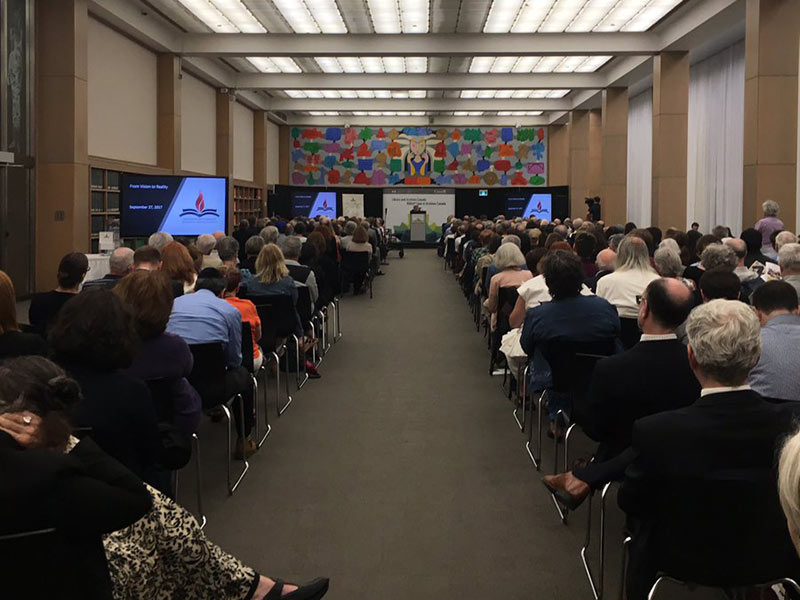The Embassy of Israel in Canada and Carleton University’s Centre for Holocaust Education and Scholarship (CHES) hosted a solemn event at Library and Archives Canada on Sept. 27 to honour the inauguration of Canada’s National Holocaust Monument.
The event brought together more than 300 survivors, their families, and distinguished guests from across the country.
“I always hope your children, your grandchildren, as well as mine, will draw from the experiences of survivors the inspiration to live life fully,” said child Holocaust survivor Robert Krell. “To value perseverance in face of great obstacles, and to never despair.
Krell, a psychiatrist and founding president of the Vancouver Holocaust Education Centre, delivered the keynote speech “From Vision to Reality.” He called the inauguration a milestone for Canada and Jewish people around the world.
Daniel Friedman, the National Monument Council chair and rabbi at Beth Israel Synagogue in Edmonton, spoke about the importance of the monument, saying it is meant to remember the victims of the German Nazi genocide, to honour the contributions of the Jewish people to Canadian society, and to symbolize Canada’s commitment to stand at the forefront of eliminating racism, bigotry and anti-Semitism.
The largest and most complex new monument in Ottawa in more than 70 years, it was designed by architect Daniel Libeskind and the site was chosen at the intersection of the Wellington and Booth Streets in 2013. Shaped like a massive Star of David, the monument is designed to carry forward the legacy of the Holocaust.
“National Holocaust monuments are complicated,” said Friedman. “Because they need to fit in with the landscape and at the same time need to be jarring, to be in our faces, to remind us loud and clear of our obligations.”
To pass on memories of the tragedy is of the utmost importance to Holocaust education, said Krell, who talked in depth about his experiences during and after history’s darkest period, where an estimated 93 per cent of the children in Nazi-occupied countries were killed. As a three-year-old, he was kept safely hidden by Dutch Christians: “My hair was dark and curly in a family of blondes.”
Mina Cohn, director of CHES, premiered a screening of the centre’s efforts to preserve these histories. She played a half-hour film, a testimonial of Tova Clark, who was born in Germany in 1939, and two excerpts from Ottawa Survivors’ Testimonials. These films were created for educational purposes and Cohn reported that professors at Carleton, the University of Ottawa and public school boards have begun using them in their classrooms.
Housed within the Max and Tessie Zelikovitz Centre for Jewish Studies, CHES was founded in 2015 to promote a deeper understanding of the history and legacy of the Holocaust by offering year-round programming and educational opportunities. CHES also aims to create a more inclusive society by eliminating prejudice, bigotry and racism in all forms.
“It is easy for a Jew to fall victim to despair for our future is still uncertain,” concluded Krell. “But Jews are forbidden to despair, we are commanded to hope and to dream. And so are you.”
